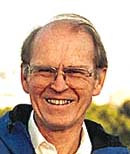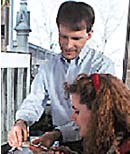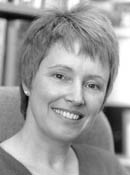 <a onClick="window.open('/olcweb/cgi/pluginpop.cgi?it=jpg::Cleveland P. Hickman::/sites/dl/free/0072439408/81971/hickman.jpg','popWin', 'width=NaN,height=NaN,resizable,scrollbars');" href="#"><img valign="absmiddle" height="16" width="16" border="0" src="/olcweb/styles/shared/linkicons/image.gif">Cleveland P. Hickman (5.0K)</a>Cleveland P. Hickman <a onClick="window.open('/olcweb/cgi/pluginpop.cgi?it=jpg::Cleveland P. Hickman::/sites/dl/free/0072439408/81971/hickman.jpg','popWin', 'width=NaN,height=NaN,resizable,scrollbars');" href="#"><img valign="absmiddle" height="16" width="16" border="0" src="/olcweb/styles/shared/linkicons/image.gif">Cleveland P. Hickman (5.0K)</a>Cleveland P. Hickman
Cleveland P. Hickman, Jr., Professor Emeritus of Biology at Washington and Lee University in Lexington, Virginia, has taught zoology and animal physiology for more than 30 years. He received his Ph.D. in comparative physiology from the University of British Columbia, Vancouver, B.C. in 1958 and taught animal physiology at the University of Alberta before moving to Washington and Lee University in 1967. He has published numerous articles and research papers in fish physiology, in addition to co-authoring the highly successful texts: Integrated Principles of Zoology, Biology of Animals, Animal Diversity, Laboratory Studies in Animal Diversity, and Laboratory Studies in Integrated Principles of Zoology.
Over the years Dr. Hickman has led many field trips to the Galápagos Islands. His current research is on intertidal zonation and marine invertebrate systematics in the Galápagos. He has published three field guides in the Galápagos Marine Life Series for the identification of echinoderms, marine molluscs, and marine crustaceans. (To read more about these field guides, visit http://www.galapagosmarine.com.)
His interests include scuba diving, woodworking, and participating in chamber music ensembles.
Dr. Hickman can be contacted at: hickman.c@wlu.edu.  <a onClick="window.open('/olcweb/cgi/pluginpop.cgi?it=jpg::Larry S. Roberts::/sites/dl/free/0072439408/81971/roberts.jpg','popWin', 'width=NaN,height=NaN,resizable,scrollbars');" href="#"><img valign="absmiddle" height="16" width="16" border="0" src="/olcweb/styles/shared/linkicons/image.gif">Larry S. Roberts (5.0K)</a>Larry S. Roberts <a onClick="window.open('/olcweb/cgi/pluginpop.cgi?it=jpg::Larry S. Roberts::/sites/dl/free/0072439408/81971/roberts.jpg','popWin', 'width=NaN,height=NaN,resizable,scrollbars');" href="#"><img valign="absmiddle" height="16" width="16" border="0" src="/olcweb/styles/shared/linkicons/image.gif">Larry S. Roberts (5.0K)</a>Larry S. Roberts
Larry S. Roberts, Professor Emeritus of Biology at Texas Tech University and an adjunct professor at Florida International University, has extensive experience teaching invertebrate zoology, marine biology, parasitology, and developmental biology. He received his Sc.D. in parasitology at the Johns Hopkins University and is the lead author of Foundations of Parasitology, sixth edition. Dr. Roberts is also co-author of Integrated Principles of Zoology, Biology of Animals, and Animal Diversity, and is author of The Underwater World of Sport Diving.
Dr. Roberts has published many research articles and reviews. He has served as President of the American Society of Parasitologists, Southwestern Association of Parasitologists, and Southeastern Society of Parasitologists and is a member of numerous other professional societies. Dr. Roberts also serves on the Editorial Board of the journal, Parasitology Research. His hobbies include scuba diving, underwater photography, and tropical horticulture.
Dr. Roberts can be contacted at: RobertsLS@cs.com  <a onClick="window.open('/olcweb/cgi/pluginpop.cgi?it=jpg::Allan Larson::/sites/dl/free/0072439408/81971/larson.jpg','popWin', 'width=NaN,height=NaN,resizable,scrollbars');" href="#"><img valign="absmiddle" height="16" width="16" border="0" src="/olcweb/styles/shared/linkicons/image.gif">Allan Larson (7.0K)</a>Allan Larson <a onClick="window.open('/olcweb/cgi/pluginpop.cgi?it=jpg::Allan Larson::/sites/dl/free/0072439408/81971/larson.jpg','popWin', 'width=NaN,height=NaN,resizable,scrollbars');" href="#"><img valign="absmiddle" height="16" width="16" border="0" src="/olcweb/styles/shared/linkicons/image.gif">Allan Larson (7.0K)</a>Allan Larson
Allan Larson is a professor at Washington University, St. Louis, MO. He received his Ph.D. in Genetics at the University of California, Berkeley. His fields of specialization include evolutionary biology, molecular population genetics and systematics, and amphibian systematics. He teaches courses in macroevolution, molecular evolution, and the history of evolutionary theory, and has organized and taught a special course in evolutionary biology for high-school teachers.
Dr. Larson has an active research laboratory that uses DNA sequences to examine evolutionary relationships among vertebrate species, especially in salamanders and lizards. The students in Dr. Larson's laboratory have participated in zoological field studies around the world, including projects in Africa, Asia, Australia, Madagascar, North America, South America, and the Caribbean Islands. Dr. Larson has authored numerous scientific publications, and has edited for the journals The American Naturalist, Evolution, Journal of Experimental Biology, Molecular Phylogenetics and Evolution, and Systematic Biology. Dr. Larson serves as an academic advisor to undergraduate students and supervises the undergraduate biology curriculum at Washington University.
Dr. Larson can be contacted at: larson@wustlb.wustl.edu.  <a onClick="window.open('/olcweb/cgi/pluginpop.cgi?it=jpg::Helen I'Anson::/sites/dl/free/0072439408/81971/helen_ianson.jpg','popWin', 'width=NaN,height=NaN,resizable,scrollbars');" href="#"><img valign="absmiddle" height="16" width="16" border="0" src="/olcweb/styles/shared/linkicons/image.gif">Helen I'Anson (12.0K)</a>Helen I'Anson <a onClick="window.open('/olcweb/cgi/pluginpop.cgi?it=jpg::Helen I'Anson::/sites/dl/free/0072439408/81971/helen_ianson.jpg','popWin', 'width=NaN,height=NaN,resizable,scrollbars');" href="#"><img valign="absmiddle" height="16" width="16" border="0" src="/olcweb/styles/shared/linkicons/image.gif">Helen I'Anson (12.0K)</a>Helen I'Anson
Helen I'Anson, a native of England, is associate professor of Biology at Washington & Lee University in Lexington, Virginia. She received her Ph.D. in Physiology at the University of Kentucky, Lexington, KY, and post-doctoral training at the University of Michigan, Ann Arbor, MI. She teaches courses in Animal Physiology, Microanatomy, Neuroendocrinology and Reproductive Physiology. She has an active research program that focuses on the neural regulation of reproductive development. In particular, she is interested in how energy is partitioned in the developing animal, how signals from food and food storage depots are monitored by the brain, and how such signals are transduced to regulate reproductive activity at the onset of puberty in mammals.
Her interests include gardening, hiking, fishing, aromatherapy, music, and participating in choral ensembles.
Dr. I'Anson can be contacted at: hianson@wlu.edu. |




